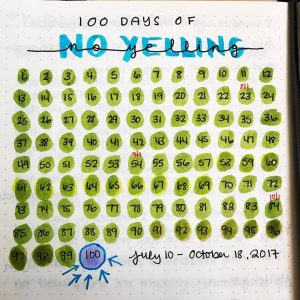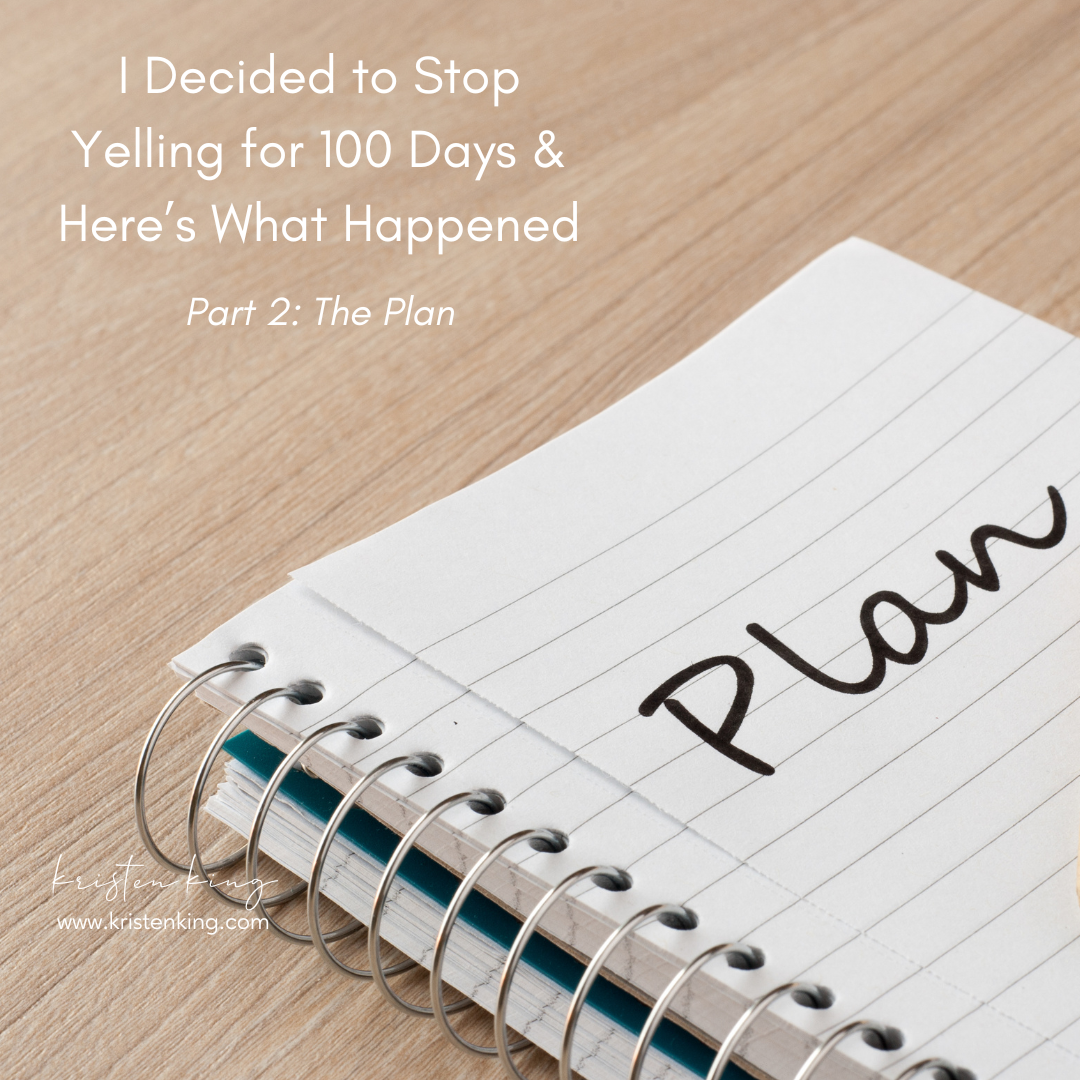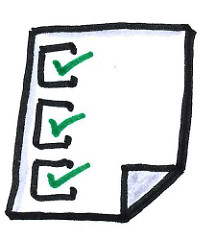This is the second post in a series about why and how I gave up yelling at my kids — for good. Read Part 1: The Meltdown.
I knew that if I was going to make good on my promise to my child — which I had clarified as “Never yell at you again because no one should ever talk to you that way” — I had to take it seriously, and I needed a plan. It had to be life and death. It occurred to me that, if my son had been diagnosed with cancer and the only cure was to never yell again, I would find a way to make that happen. So I decided this:
If I ever yell at my child again, he will be struck by lightning from above and die instantly.
Yeah, I know it may sound ridiculous. But it was life and death. It was about loving my child into a beautiful life or killing his spirit and making sure he would never have self-esteem or functional relationships thanks to my shitty mothering. This is not hyperbole. Children who are verbally abused by their parents — and make no mistake, what I did that day and what I had done on a lesser scale at other times was undoubtedly verbal abuse — experience serious and lasting impacts in their brain. It changes them.
Own the Problem
Kids who experience abuse and traumatic events in childhood, particularly in early childhood when their brains are incredibly vulnerable, are more likely to have poorer physical and mental health and to have negative social consequences later in life. These things are called adverse childhood experience, or ACEs, and they include physical, emotional, and sexual abuse; neglect and abandonment; forced separation from family members or important others; exposure to drug and alcohol abuse; and a host of other issues. Verbal abuse is the first item listed on the ACEs survey. (Find your ACE Score and learn more about the ACEs Study.)
I love my kids, I take care of them, I provide for them, I try to do right by them, and I also have screamed at them. It wasn’t all the time and that day was definitely the worst, but even if that day had been the only day in my entire parenting career that I had ever yelled at all, it was abuse. I’m ashamed of it and I own it because if we don’t own our shit we can’t take responsibility for it. If we don’t take responsibility, make a plan, and stay accountable, we will do it again.
Commit to the Solution & Desired Outcome
Failure was not an option in this situation. I had already failed my child once, in a big way. I was not going to do it again. This was life-or-death serious, and I treated it that way. I thought about what I wanted to accomplish and came up with a mission statement that would guide my no-yelling plan:
My number-one goal is to give my kids a peaceful home, no matter what it takes.
I know that kids from a peaceful home where they learn and experience unconditional love, emotional intelligence, and support are the kids who are most likely to succeed and have happy lives. (There are decades of research and anecdotal evidence supporting this; sharing it all is outside the scope of this series but you can read it at your leisure. Start with ACEs.) I’m not raising children here, I’m raising adults — and I want them to be healthy adults who can have healthy, loving, fulfilling, functional lives and relationships. The best way to help them have that is to give them a peaceful, loving, supportive home with parents who model good relationships, good communication, and love as an action not just as a saying.
For the purposes of giving up yelling, I defined yelling as loss of control rather than speech at high volume. I have always been a loud, boisterous, exuberant person even in a great mood, so it wasn’t about volume. In a house with two 5-year-olds and a mess of pets, sometimes volume is needed. Volume wasn’t the problem. The problem was lack of control and intention. If I was out of control of my emotions and/or my intention was to win, intimidate, berate, or otherwise make less of, that would be considered yelling — and it wasn’t going to happen again.
Tell the Kids What’s Up and Enroll Them in Helping
I sat my son down and reiterated my promise: I was not going to yell again at all any more, and I wanted his help. We talked through the things that have caused me to yell in the past and came up with a list together:
- Someone is not listening and Mommy is frustrated.
- Something dangerous is about to happen and Mommy needs to save us/stop us.
These were the external stimuli. We only came up with two — and only one of them is a good reason to yell. (More on the other, internal, reasons I yelled in the next post in this series.) We decided yelling for an emergency didn’t count. “STOP! THERE’S A CAR!” is okay. “DON’T MOVE! SNAKE!” is no problem. “STOP! SOMEONE IS GOING TO FALL!” is fine. But then back to calm conversational voice.
So we made a deal: I would stop yelling, and he would work on listening the first time. We would be a no-more-yelling team. We would remind each other if we could see that the other person was not following the deal. He would say, “Mommy, you need to take a deep breath” or “Mommy, I feel like you might be ready to yell again.” I would say, “Remember, you promised to listen the first time because we are a team and we have to work together.”
Find and Practice Alternatives to Yelling
I scoured the internet for ideas of things to do instead of yelling. My favorite was whispering, a trick I had heard variously from Dr. Phil, Laura Markham of AhaParenting, the Orange Rhino blog, and assorted peaceful parenting Facebook groups. And I don’t mean the kind of whispering where it’s a thinly veiled threat to their health and safety, like “I swear to God if you don’t get your ass in your seat you won’t be able to see straight” hissed under the restaurant table. I mean actual whispering, so they have to strain to hear you.
I recommitted to using playful connection and empathy to guide and redirect. This was an approach I had used successfully for a long time, but I had gotten away from it — with disastrous results. My favorite playful way to elicit cooperation was a trick I got from a mom friend of mine, which we call “Robot Mama.” Whatever my request is, I repeat it again in a robot voice: “Ro-bot-Ma-ma-says-get-ready-for-bed.” Sometimes I add robot arms and stiff legs and walk toward them as I do it. It gets them moving, and giggling, most of the time and relieves stress for all of us.
I quickly learned that the most effective way for me to head off yelling was to absolutely not argue no matter what. Arguing is a slippery slope right into a power struggle which leads right into yelling. Ways I approached situations where I had previously yelled, without arguing:
- Take slow deep breaths and repeat the request cheerfully and positively. “As soon as we get ready for bed, we can read our book. Who wants to have enough time for a whole book? Let’s go then!”
- Get their full attention and repeat my request in simpler terms. “Look at Mommy, please. Right at my face. Thank you. It is time to get ready for bed. The TV is going off. Go pee and get your jams on now, please.”
- Label my feelings and ask for help. “I’m feeling frustrated because I’m asking you to do something and you’re not listening to me. What is the problem? How can we work together to do this?”
- Ask my husband to help me. “The kids are NOT doing what I’ve asked and I’m about to lose my shit. Can you tap in while I take a break?”
- Label my feelings and take a break. “I keep asking you do this and you’re not doing it. I’m feeling mad and I want to yell, so I’m going to go take a time out and calm down. When I come back, we’re going to talk about this.” (Tip: Take the TV remote with you.)
- Offer choices that involve logical, natural consequences. “The clothes/toys/movies need to get put away. Either you can do it, or I can do it. If I do it, I’m going to put them away with another family that will take care of them.” (Alternative: A friend shared that she used to charge her children “maid fees” if they didn’t clean up. Just like in the adult world, if you don’t want to clean up you can pay someone else to do it for you.)
- Lean on natural consequences whenever possible, and alert children to consequences so they can make informed decisions. “We have 20 minutes before it’s lights out. You can keep playing and then go straight to sleep in 20 minutes, or you can get dressed now and we’ll have time to read before bed. Do you want YES book or NO book?”
Cultivate Helpful Self-Talk
I also identified several things I could say to myself when I became frustrated, to help me calm down. Some of the ones that worked best for me are:
- “There is nothing wrong here. Take a deep breath. This is how they learn.”
- “They’re just checking to see where the boundaries are. Take a deep breath, stay calm, and show them.”
- “You don’t have to fix anything. They can choose to listen or not listen. They’re allowed to make mistakes.”
- “Kids are allowed to have big feelings too. Just be with them and help them get through it.”
- “It’s okay to feel frustrated. Just keep breathing. You’re showing them how to manage frustration in a healthy way.”
- “LIGHTNING. FUCKING LIGHTNING. IF YOU SCREAM, THERE WILL BE LIGHTNING AND THEY WILL DIE SO DO.NOT.FUCKING.DO.IT.”

My no-yelling tracker. https://www.instagram.com/p/Bar9bUUhmnf/?taken-by=kristenskoveking
Develop an Accountability System
To keep myself focused and honest, I developed an accountability system. I created a tracker in my bullet journal for 100 days of no yelling, and marked off each day as it went by. As I wrote out the numbers 1-100, I kept telling myself, “This is stupid. You are going to have to write these numbers out a million times before you finally go even a week without yelling. You’re crazy to think you can go 100 days without yelling.” But I reminded myself that failure was not an option so I would only have to do this once and quit it with the negative self-talk already.
Ask for Outside Help and Support
I shared about what I was doing with my kids, and also with close friends, family members, and my social media network. I told my colleagues in a 4-month personal development class I was taking what I was doing and asked for their support and accountability. I spoke frankly with others about what I was struggling with and why it mattered. I created a community of supportive people around me, and it made a huge difference. They became invested in what I was doing, and when I struggled, they reminded me why no more yelling was so important to me and my family. They reminded me of the WHY when the HOW seemed impossible.
Be Honest and Transparent about What’s Going On
On days when I was struggling, I asked for help from friends, family, and even my kids. I modeled how to label my feelings with the kids and how to process them. I asked the kids to talk to me about why Mommy not yelling made a difference and how it had been a long time since Mommy yelled and we like it so much better without yelling. When we had communication breakdowns, we started to talk about them and how they made us feel. Transparency, communication, and teamwork were key.
No-Yelling Plan Summary
- Own the problem and commit to the solution and outcome you want.
- Tell the kids what’s up and enroll them in helping you.
- Find and practice alternatives to yelling.
- Cultivate helpful self-talk.
- Develop an accountability system.
- Ask for outside help and support.
- Be honest and transparent about what’s going on.
Posts in the No-Yelling Series
I Decided to Stop Yelling for 100 Days & Here’s What Happened
This is a series of posts chronicling what happened when I stopped yelling at my 5-year-old twins — or anyone else, for that matter — for 100 consecutive days. Each article in the series will be updated with additional links as I add more posts.
- Part 1: The Meltdown
- Part 2: The Plan (current article)
- Part 3: How Did We Get Here?






